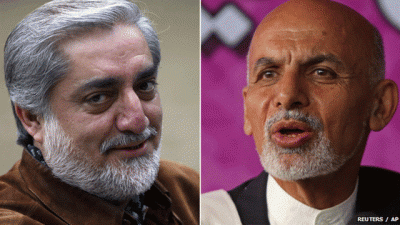 The two leading candidates in the race to become Afghanistan’s next president rallied supporters and urged election officials to come clean on fraud on Sunday as the country readied for an expected grueling run-off in June.
The two leading candidates in the race to become Afghanistan’s next president rallied supporters and urged election officials to come clean on fraud on Sunday as the country readied for an expected grueling run-off in June.
Abdullah Abdullah and Ashraf Ghani, both ministers in the transition government after U.S.-led forces drove the Taliban from power in 2001, shared over three-quarters of the nearly 7 million votes cast, but neither clinched an absolute majority.
If, as expected, the final results due next month show no outright winner, a second round will be held on June 7.
After decades of war and foreign occupation, Afghanistan is being left to stand on its own feet this year with the political change-of-guard and the withdrawal of foreign combat troops by Dec. 31.
More than 12 years after U.S. troops invaded Afghanistan to capture al Qaeda militants blamed for the Sept. 11 attacks on the United States, a potent Islamist insurgency is still the biggest problem confronting the government.
With an eye on a run-off, the two frontrunners rallied their supporters on Sunday, applauding them for coming out in record numbers to vote. The turnout in the first round was 50 percent higher than the 2009 vote.
“If round one was a new beginning then round two is the maturity of democracy and an opportunity to strengthen national unity,” Ghani told a news conference. “We expect our supporters will have a widespread participation in the runoff.”
The voting process, which started on April 5 under the threat of violence from the Taliban, is the first democratic transition of power in the country’s history.
However, uncertainty over the outcome risks stalling crucial foreign aid and economic reform, and could foment ethnic tensions and leave a political vacuum in which the Taliban could gain ground.
Washington’s relationship with President Hamid Karzai has sharply deteriorated over the past year, exacerbated by his refusal to sign a bilateral security agreement permitting a small force to stay for counter-terrorism support and training after the December drawdown deadline.
The two pro-Western candidates say they will sign the pact.
FRAUD COMPLAINTS
Abdullah, who cited fraud as the reason for quitting in 2009 before a scheduled run-off against Karzai, again disputed the result. Karzai was constitutionally barred from standing for a third term.
“Our team’s victory is very clear,” said Abdullah, who finished top in the preliminary count with 44.9 percent.
“If the problems were addressed on ballot shortages, the picture would have been different,” he said, referring to hundreds of polling stations that ran out voting papers on the polling day.
Ghani, who polled 31.5 percent in the preliminary count, also cried foul but said the outcome was clear.
“The key thing is no one can claim that the first round has produced a victory,” said the former finance minister and ex-World Bank economist.
The Election Complaints Commission is scrutinising votes from hundreds of polling stations. Even if Abdullah were to win all of the suspect votes under investigation he would still fall short of the 50 percent-plus-one needed to win outright. Final results are due on May 14.
ETHNIC SPLIT
Behind the scenes, the top contenders have already started lobbying to mop-up votes from the losing candidates.
Abdullah, an ophthalmologist who also fought Soviet forces in the 1980s, has reached out to Zalmay Rassoul, a favourite of the ethnic Pashtun majority in the south of Afghanistan, who won 11.5 percent of the vote.
Abdullah’s base of support is in the ethnic Tajik community and, although he is half-Pashtun, he is best known for championing the causes and rights of Tajiks, Afghanistan’s second-largest ethnic group.
Rassoul’s support is believed to have the backing of the powerful Karzai clan, who are also Pashtun. Both Ghani and Abdullah have promised an advisory role for the outgoing president.
Another kingmaker could be Islamist politician Abdul Rassoul Sayyaf, who finished fourth with 7.1 percent. Sayyaf presents himself as a bridge between warring factions, and says peace can be reached with the Taliban if they renounce outside influence.
As a means to swiftly move on with the political transition and to avoid the logistical and security concerns of another round, some observers have suggested it might be in the nation’s best interests if Abdullah and Ghani struck a deal.
But the bitter rivals ruled that out on Sunday.
Taliban militants threatened to derail the first round with a violent onslaught, prompting the government to deploy some 400,000 troops for the vote. The security clampdown was largely effective.
The second round poses an even bigger risk, with insurgents allowed even more freedom of movement due to the warmer weather.
Reuters

Leave a Reply
You must be logged in to post a comment.